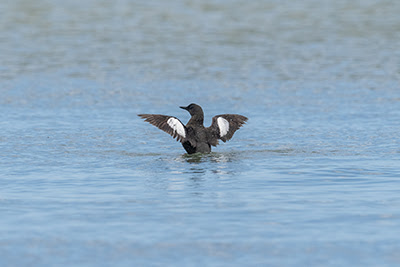Orion, The Plough, Cassipoea, The Seven Sisters and Cirrus, the Dog Star, were all brilliantly visible.
The occasional Snipe and Redshank were flushed off the marsh as we set the mist nets high above the brackish water. The water was oily and even by 18.00 its state was changing from a liquid to a viscous oilyness as the temperature dropped and it began to freeze over to attain its solid state.
Mad as we might seem we were in N Wales, forsaking a warm comfortable house for a night outside on one of the coldest nights forecast this winter. Our target was Dunlin.
Without artificial light your sensors are heightened. Every noise is amplified and features you'd never glance at during the day become recognisable landmarks enabling to find your way around. Your steps are stealthily cautious - not to avoid disturbing anything but to make sure you don't trip over! Not being able to use a torch meant the birds are extracted by touch. Another sense heightened. Just as well seeing as I'd 'lost my reading glasses' (I thought they'd fallen out of my pocket but found them on my desk this morning).
As the tide flooded birds began to move and we started catching. A Ringed Plover first, followed by Dunlin and Redshank. Not as many as had been hoped for as the frozen marsh seemed to deter the birds from flying in and under such conditions they tend to stick to the tide line. It was enough for our small team though and gave me plenty of exercise taking the birds back to the processing station that had been set up about 5 minutes walk back along the beach. Here the birds were ringed, aged, biometrics taken and released to continue their nocturnal activities.
As it got later and the temperature got colder the water froze harder and we were cracking the ice as we waded through it to check the nets. Around 10 pm, when it became obvious that we weren't going to catch much more, we started packing up. I eventually got home at midnight. Tired, muddy, sweaty but happy.
Redshank




























































No comments :
Post a Comment